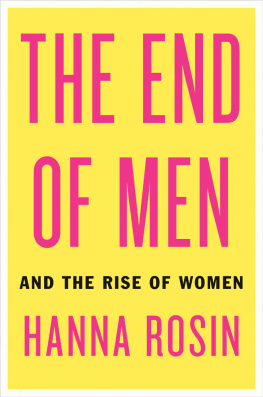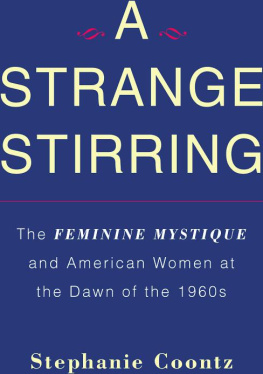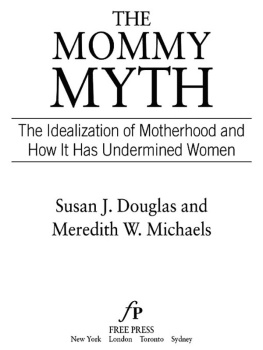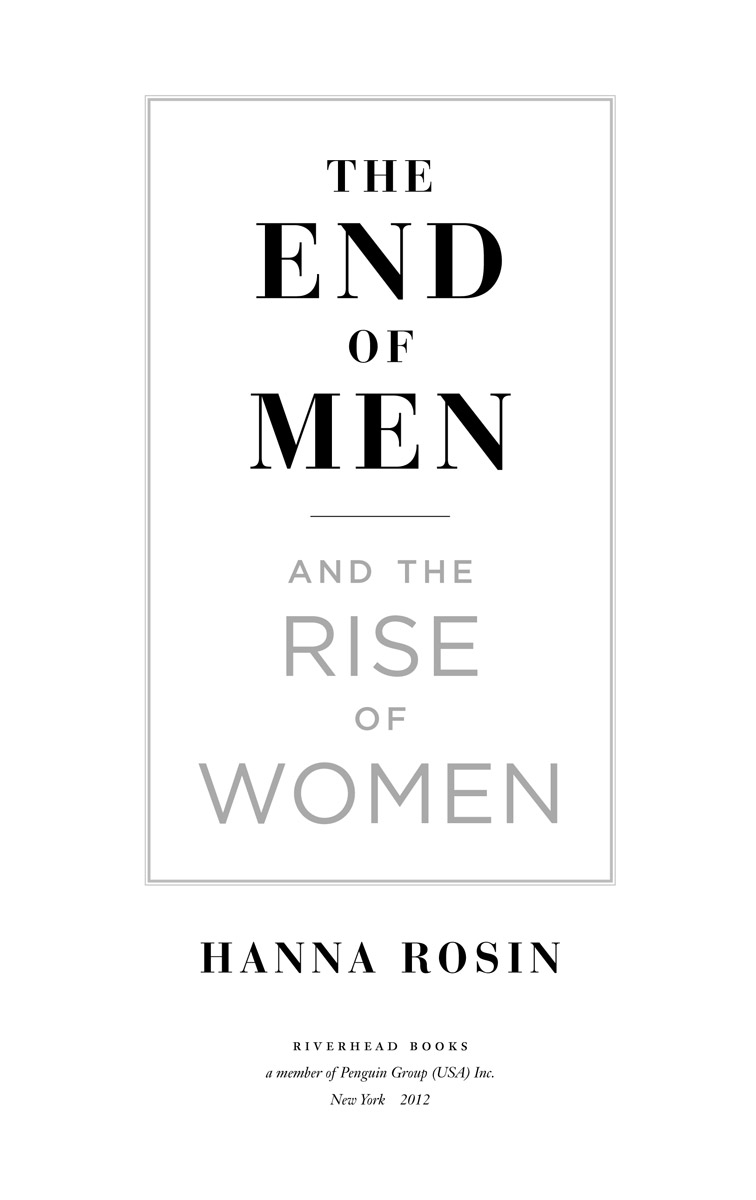THE
END
OF
MEN

RIVERHEAD BOOKS
Published by the Penguin Group
Penguin Group (USA) Inc., 375 Hudson Street, New York, New York 10014, USA Penguin Group (Canada), 90 Eglinton Avenue East, Suite 700, Toronto, Ontario M4P 2Y3, Canada (a division of Pearson Penguin Canada Inc.) Penguin Books Ltd, 80 Strand, London WC2R 0RL, England Penguin Ireland, 25 St Stephens Green, Dublin 2, Ireland (a division of Penguin Books Ltd) Penguin Group (Australia), 250 Camberwell Road, Camberwell, Victoria 3124, Australia (a division of Pearson Australia Group Pty Ltd) Penguin Books India Pvt Ltd, 11 Community Centre, Panchsheel Park, New Delhi-110 017, India Penguin Group (NZ), 67 Apollo Drive, Rosedale, North Shore 0632, New Zealand (a division of Pearson New Zealand Ltd) Penguin Books (South Africa) (Pty) Ltd, 24 Sturdee Avenue, Rosebank, Johannesburg 2196, South Africa
Penguin Books Ltd, Registered Offices: 80 Strand, London WC2R 0RL, England
Copyright 2012 by Hanna Rosin
All rights reserved. No part of this book may be reproduced, scanned, or distributed in any printed or electronic form without permission. Please do not participate in or encourage piracy of copyrighted materials in violation of the authors rights. Purchase only authorized editions. Published simultaneously in Canada
Grateful acknowledgment is made to The Atlantic, where portions of this book previously appeared in slightly different form.
Library of Congress Cataloging-in-Publication Data
Rosin, Hanna.
The end of men : and the rise of women / Hanna Rosin.
p. cm.
Includes bibliographical references and index.
ISBN: 978-1-101-59692-0
1. WomenSocial conditions21st century. 2. WomenEconomic conditions
21st century. 3. Feminism. I. Title.
HQ1155.R67 2012 2012018005
305.42dc23
While the author has made every effort to provide accurate telephone numbers, Internet addresses, and other contact information at the time of publication, neither the publisher nor the author assumes any responsibility for errors, or for changes that occur after publication. Further, the publisher does not have any control over and does not assume any responsibility for author or third-party websites or their content.
To Jacob, with apologies for the title
INTRODUCTION
This world has always belonged to males, and none of the reasons given for this have ever seemed sufficient.
Simone de Beauvoir, The Second Sex
I n 2009, in a beach town in Virginia where my family had been vacationing for several years, I noticed something curious. Every time I ventured away from the houses rented by the vacationersto the supermarket, say, or the ice cream storeI almost never saw any men. Hardly any showed up at the fairgrounds Saturday evenings, nor did many climb out of the cars in the church parking lots on Sunday mornings, as they had in previous years. This was a prosperous working-class town, and one of its main businesses had always been construction. I recalled in earlier years seeing groups of men riding in pickup trucks down the main streets, even on Saturdays. But this time, there werent all that many pickup trucks; mostly Chevys and Toyotas filled with women and children going about their weekend business.
On a food run one afternoon, I accidentally slammed my cart into another womans and knocked out of it some granola bars that had been balanced on a giant box of Cheerios. I apologized and she was forgiving, and in fact she turned out to be the kind of stranger who is open to conversation. Her name was Bethenny, she told me. She was twenty-nine and ran a day care out of her house (hence, the Cheerios). She was also studying to get a nursing degree and raising her daughter, who was ten. Because she was so forthcoming I thought Id edge closer to the heart of the matter. Was she married? I asked. No. Did she want to be? Kind of, she said, and spun me a semi-ironic fantasy of a Ryan Reynolds look-alike swooping in on a white horse, or maybe a white Chevy. Was there any mortal male who might qualify for the role? I asked. Well, theres Calvin, she said, meaning her daughters father. She looked over at her daughter and tossed her a granola bar and they both laughed. But Calvin would just mean one less granola bar for the two of us.
Bethenny seemed to be struggling in the obvious ways. Later I saw her at checkout, haggling over coupons. But she did not exactly read as the pitiable single mother type. There was genuine pleasure in that laugh, a hint of happy collusion in hoarding those granola bars for herself and her daughter. Without saying as much, she communicated to me what her daughter seemed already to understand and accept: By keeping Calvin at arms length, Bethenny could remain queen of her castle, and with one less mouth to feed, they might both be better off.
How is it that the father of her only child had so little hold on her? How could his worth be measured against the value of a snack? I got up the courage to ask her if I could contact Calvin, and she readily gave me his phone number.
Over the next few months Calvin and I talked every few weeks, me always trying to figure out how he had become so invisible. He was a gentle, earnest type and hard not to like. He talked about all the jobs hed held and hated and I gave him advice, about work and other important matters (such as how to operate the microwave at the 7-Eleven, a source of constant frustration during his mid-afternoon food runs). I had an idea that I might write a story about what was happening to guys like Calvin in the postmanufacturing age, that Calvin might help me solve the mystery of those missing men.
The terms mancession and he-cession featured prominently in headlines that year, their efforts at cuteness meant to soften the painful reality that the primary victims of our latest economic disaster had been men like Calvin, the ordained breadwinners. If these men had already been laid low by the recession of the 1990s, I wondered, where were they now, nearly twenty years later, after this last series of blows? And how would they find their way back? My hope was to stay in touch with Calvin long enough that he would start earning enough money to pick up the grocery bill again, that he would find his way home. Part of me kept imagining some distant point in the future when, like in the old Ladies Home Journal Can This Marriage Be Saved? series, Calvin and Bethenny would get back together and forge a happy trio, and in the dramatic crescendo of any imaginary reality series, the streets of the town would once again become peopled with men.
But as I spent time with Calvin and dug into the research, I discovered that I had started with the wrong questions. Calvin and his friends were not really trying to get back the lives theyd once had, because those lives were no longer there to get back. I began to understand that something seismic had shifted the economy and the culture, not only for men but for women, and that both sexes were going to have to adjust to an entirely new way of working and living and even falling in love. Calvin was not going to drive up in a Chevy and take his rightful place at the head of the table one day soon, because Bethenny was already occupying that space, not to mention making the monthly payments on the mortgage, the kitchen renovation, and her own used car. Bethenny was doing too much but she was making it work, and she had her freedom. Why would she want to give all that up?
Next page










